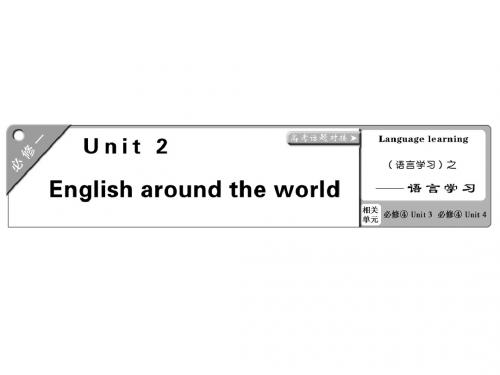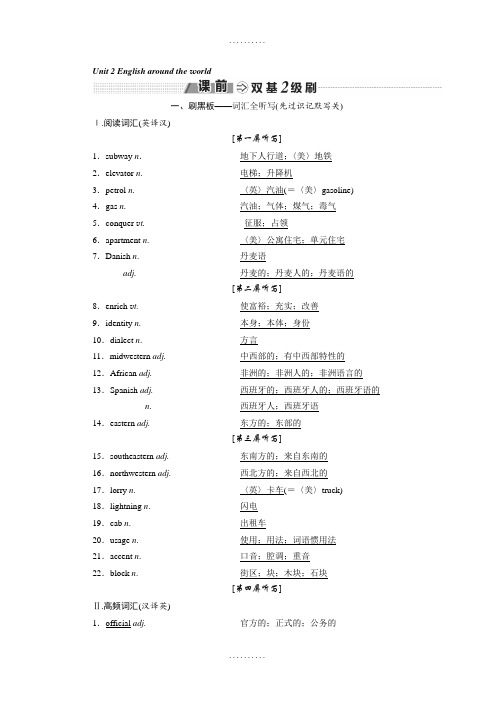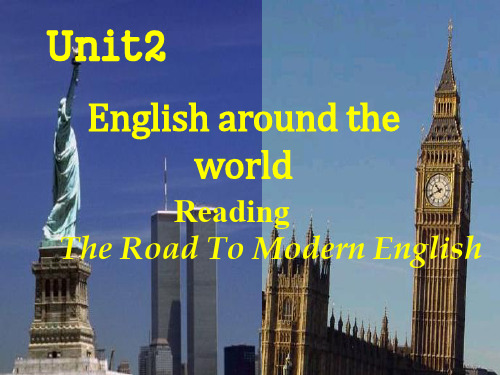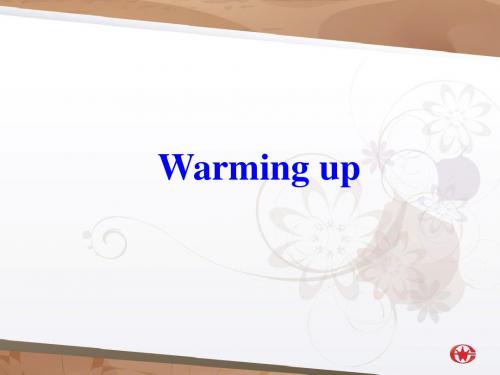2019高考英语必修1Unit2Englisharoundtheworld配套练习题含解析
- 格式:doc
- 大小:3.11 MB
- 文档页数:39



Unit 2 English around the w orld一、刷黑板——词汇全听写(先过识记默写关)Ⅰ.阅读词汇(英译汉)[第一屏听写]1.subway n.地下人行道;〈美〉地铁2.elevator n. 电梯;升降机3.petrol n. 〈英〉汽油(=〈美〉gasoline) 4.gas n. 汽油;气体;煤气;毒气5.conquer v t.征服;占领6.apartment n. 〈美〉公寓住宅;单元住宅7.Danish n. 丹麦语adj.丹麦的;丹麦人的;丹麦语的[第二屏听写]8.enrich v t.使富裕;充实;改善9.identity n. 本身;本体;身份10.dialect n. 方言11.midwestern adj.中西部的;有中西部特性的12.African adj.非洲的;非洲人的;非洲语言的13.Spanish adj.西班牙的;西班牙人的;西班牙语的n. 西班牙人;西班牙语14.eastern adj.东方的;东部的[第三屏听写]15.southeastern adj.东南方的;来自东南的16.northwestern adj.西北方的;来自西北的17.lorry n. 〈英〉卡车(=〈美〉truck) 18.lightning n. 闪电19.cab n. 出租车20.usage n. 使用;用法;词语惯用法21.accent n. 口音;腔调;重音22.block n. 街区;块;木块;石块[第四屏听写]Ⅱ.高频词汇(汉译英)1.official adj.官方的;正式的;公务的2.voyage n. 航行;航海3.native adj.本国的;本地的n. 本地人;本国人4.actually ad v. 实际上;事实上5.base v t.以……为根据n. 基部;基地;基础[第五屏听写]6.gradual adj.逐渐的;逐步的7.gradually ad v. 逐渐地;逐步地8.spelling n. 拼写;拼法9.vocabulary n. 词汇;词汇量;词表10.latter adj.较后的;后半的;(两者中)后者的11.fluent adj.流利的;流畅的12.fluently ad v. 流利地;流畅地[第六屏听写]13.frequent adj.频繁的;常见的14.frequently ad v. 常常;频繁地15.command n.& v t.命令;指令;掌握16.request n.&v t.请求;要求17.expression n. 词语;表示;表达18.recognize v t.辨认出;承认;公认19.straight ad v. 直接;挺直adj.直的;笔直的;正直的[第七屏听写]20.because_of因为;由于21.come_up 走近;上来;提出22.at_present 现在;目前23.make_use_of 利用;使用24.such_as 例如……;像这种的25.play_a_part_(in) 扮演一个角色;参与二、刷清单——热身自盘点(再过基本应用关)一、过重点单词——纵引横联超人一点1.base vt.以……为根据n .基部;基地;基础[高考佳句] The research group produced two reports based on the survey, but neither contained any useful suggestions.(2015·福建高考单选)[题点全练]单句语法填空①Basing (base) an important decision more on emotion than on reason, you will regret it sooner or later.②First, he showed us the basic (base) steps and skills of making dough figurines.(2015·北京高考书面表达)③Just as the saying goes,“One tree doesn't make a forest.”,our success is based on/upon cooperating with others.2.command n.[C]命令;指令;[U]掌握vt.命令;指挥;掌握[经典例句]We are supposed to learn English well because having a good command of English means more opportunities in the future.[多角练透]单句语法填空①I'm at your command — what would you like me to do?②If you do not serve others, you cannot take command of them.句型转换③The police commanded the witness to describe what had happened the day before.→The police commanded that the witness (should)_describe_what_had_happened the day before.单句写作④除此之外,我精通英语并被选为英语课代表。



高中英语必修1(Unit2Englisharoundtheworldthe5thperiod)精品教案TheFifthPeriod●从容说课Thisisthefifthperiodofthisunit.Inthispart,twoitemswillbedealtwith,thatis,thewordsleftinthevocabulary,thereadingintheworkbook.Thefirstitem,learningnewwordsleftinthevocabularyistoremovethebarrierinthefollowingstudy.Andhowtoletstudentslearnthewords withinterestisadifficultissue.Ithinkitisbettertogivestudentsthechancetolearnnewwordsbythemselves.Letstudentsloo kupwordsinthedictionaryand thencomm unicatewithothersinclass,whichcaninspirestudents.Andthenletthemmakeupsomesentences.Theseconditemisanotherpassageonthesubject “English”.ItgivesstudentsmuchmoreinformationonEnglish.Todealwiththispassage,7stepsaredesigned:(1)predictwhatwillbetalked(2)listentofindoutanswers(3)answerquestions(4)scanningtofillinatable(5)summary (6)discussion(7)homework●三维目标1.Knowledge:Learningtherestwordsinthevocabulary.2.Ability:Theunderstandingofthereadingpassage.3.Emotion:Guidestudentshowtoremembermorewordsassoonaspossible.●教学重点Theunderstandin gofthereadingpassage.●教学难点(1)Howtoletstudentsmasterwords.(2)Howtoletstudentsunderstandthepassagewell.●教具准备cassetterecorder;cardswithwordsonthe m●教学过程Step1GreetingsGreetthewholeclassasusual.Step2NewwordsandvocabularyT:Yesterday,Iaskedyoutolookupthewordsleftinthevocabularyinthedictionary.Haveyoubeenpreparedforit?Now,let’shaveagame.Let’sdividethewholeclassinto2groups.Eithergroupchoosesonestudentasarepresentative.I’llshowther epresentativeawordoraphrase,sheorheshouldexplainitinEnglish.Ifthegroup’smemberscanguessit,yourgroupwillwin10points.Eithergrouphas5chances.Let’sgo!Possibleexplanation:mand:(1)v.totellsb.todosth.(2)anorder2.standard:generallyusedoracceptedasnormal3.playapartin:playarolein4.dialect:awayofspeakingthatisusedonlyinaparticulararea5.request:(1)v.toasksb.todo(2)n.anactofaskingforsth.inapoliteorformalway6.polite:theoppositeofrude7.retell:totellastoryagainorinadifferentform8.accent:awayofsayingwordsthatshowswhatcountry,esfrom9.recognize:toknowwhothepersonis10.eastern:inorfromtheeast ofacountryorplaceT:Welldone!Nowlet’sdealwiththesomeofthewordsandphrasesindeal.mandv.命令,指挥commandsb.todo;commandsth.;博得,应得commandthat-clausee.g.Hecommandedhismantoretreat.ThetroopswerecommandedbyGerneralHaig.Thekingcommandedthatshe(should)beexecuted.(建议,命令,要求一类词后从句中用虚拟语气,此类动词有suggest,advise,order,request,require,command,demand...)Hecommanded thebuilding(should)betorndown.n.命令[C];指挥,控制[U]e.g.Areyourefusingtoobeymycommands?Youmustobeyhiscommandthatthebuilding(should)betorndown.Takecommandof;beincommand;underone’scommand;underthecommandofsb.e.g.Shetookcommandofthisclassaftertheformermanagerleft.Shefeltincommandofherlife.ThebattleshipisunderthecommandofCaptainBlake.2.requestv.requeststh.(fromsb.);requestsb.todo;requestthat-clausee.g.Youcanrequestafreecopyoftheleaflet(宣传单).Youarerequestednottosmokeintherestaurant.Sherequestedthatnoone(should)betoldofherdecision untilthenextmeeting.n.request(forsth.);request(that)e.g.Requestsforvisaswillbedealtwithwithin48hours.Herrequestthatmoresweetsbeservedwasrefused.3.recognize辨认出;意识到;承认recognizesb./sth.(by/fromsth.)通过……认出……;recognizesth.(assth.);把……认作是……recognizethat意识到;承认e.g.Irecognizedthehousefromyourdescription.Drugswerenotrecognizedasaproblemthen.Nobodyrecognizedhowurgentthesituationwas.Werecognizedthatthetaskwasnoteasy.4.standardn.规格,标准[C&U]raise/improve/lowerstandard提高/降低标准set(sb.)astandard给某人定一个标准e.g.Hesethimselfsuchahighstandardthatheoftendisappointshimself.ofhigh/lowstandard具高/低标准的standards行为标准,道德标准amanofhighstandards一个道德高尚的人Step3ReadingT:WehavelearntEnglishformanyyears.Theninyouropinion,whatisaveryimportanthelptoyourEnglishstudy?S:teachers,books,tapes...T:Anythingelse?IsthereanythingthatyoucanturntoforhelpwhenyouareconfusedwhilelearningEnglish?S:Ithinkadictionaryisagreathelp.T:Yeah.Whenwemeetacrossnewwordsweoftenlookthemupinadictionary.Whatisthemostwidely-useddictionaryinChin ese?S:XinhuaDictionary.T:ThenwhichonedoyouthinkisusedwidelyinEnglish?S:I’msorryIhavenoidea.T:It’s LongmanDictionary andthe OxfordEnglishDictionary.Today,we’llreadapassageonthe OxfordEnglishDictionary.Nowaccordingtothetitle,whatdoyouthinkwillbementionedinthepassage?S:Ithinkthewriter,thetimewhenwasitwritten,whyitwaswritten,howitwaswritten,thefeatureofthedictionarywillbementioned.T:Now,let’slistentoittoseewhetheryouranswerisrigh t.(afterlistening)T:Doyouthinkthatyouranswerisright?S:Ithinkthatitdoesn’tmentionthefeatureofthedictionary.T:Yes.Nowlet’sreaditaloudtoanswerthesequestionsthen.①Whywasitwritten?②Whendiditstarttobewritten?③Whoisthewriter?④Howitwaswritten?S:①Toencourageeverybodytospellthesame.②Theideawasraisedin1857.And22yearsl ater,itbegantobewritten.③Threemenworkedtogetheronthedictionary:SamuelJohnson,NoahWebster,andJamesMurray.④Ittookthethreemennearlyalloftheirlivestotrytocollectwords.T:Goodjob!Thenwhofirstbegantoworkonthedictionary?S:Murray.T:Yes.Nowlet’sreadthelastparagraph.AndthenfinishthetableaboutnotesonJamesMurray’slifewithyourpartners.(checktogether)Step4Consolidation/discussionT:Afterreadingit,canyousaysomethingaboutMurray?Let’sdoachainreaction.EachstudentjustsaysonesentenceaboutMurray.T:Doyouthinkitworthsothesepeople’sspendingsomuchtimeon?Why?Nowdiscusswithyourpartnerandlistsomereasons.(discussforabout3minutes)Now,it’sshowtime.S:Wethinkthatitworththeirjob.Iftherewerenodictionaries,peoplewouldhavenoruletoguidethemwhileusingthelanguage,whichwillleadtoamessinEnglishbecausedifferentpeople wouldusedifferentlawstouseit.Thentherewillbemoredifficul tyinunderstandingoneanother.Withthedictionary,peoplehaveasetruletojudgewhethertheirwayofusingthelanguageisright.Step5SummaryandhomeworkToday,wehavelearnedthewordsleftinthevocabularyandwe’vegotsomeinformationonthelargeEnglishdictionary.Afterclass,pleasereadthewordsagainandagaintorecitethemandtrytousethemtomakeupsentences.●板书设计Unit2EnglisharoundtheworldTheFifthPeriodWordsmand2.request3.recognize4.standardUnderstandingofthepassageGuessingQuestions●活动与探究ThisresearchistodoresearchontheconceptoftheOxfordDictionaryandsomeotherkindsofdictionaryinEnglishspok encountries.SostudentsshouldworkingroupstostudytheitemsoftheOxfordDictionaryandfindoutthenamesofothertypenames Themostpopularone ThereasonAbout theOxfordEnglishDictionaryThe OxfordEnglishDictionary istheacceptedauthorityontheevolutionoftheEnglishlanguageoverthelastmillenniu m.Itisanunsurpassedguidetothemeaning,history,andpronunciationofoverhalfamillionwords,bothpresentandpast.Ittracestheusageofwordsthrough2.5millionquotationsfromawiderangeofinternationalEnglishlan guagesources,fromclassicliteratureandspecialistperiodicalstofilmscriptsandcookerybooks.The OED coverswordsfromacrosstheEnglish-speakingworld,fromNorthAmericatoSouthAfrica,fromAustraliaandNewZealandtotheCaribbean.Italsooffersthebestinetymologicalanalysisandinlistingofvariantspelli ngs,anditshowspronunciationusingtheInternationalPhoneticAlphabet.Asthe OED isahistoricaldictionary,itsentrystructureisverydifferentfromthatofadictionaryofcurrentEnglish,inwhichonlypresent-daysensesarecovered,andinwhichthemostcommonmeaningsorsensesaredescribedfirst.Foreachwordinthe OED,thevariousgroupingsofsensesaredealtwithinch ronologicalorderaccordingtothequotationevidence,i.e.thesenseswiththeearliestquotationsappearfirst,andthesenseswhichhavedev elopedmorerecentlyappearfurtherdowntheentry.Inacomplexentrywithmanystrands,thedevelopmentovertimecanbeseeninastructurewithseveral“branches”.TheSecondEditionofthe OED iscurrentlyavailableasa20-volumeprint edition,onCD-ROM,andnowalsoonline.Updatedquarterlywithatleast1000newandrevisedentries,OED Onlineoffersunparalleledaccesstothegreatestcontinuingworkofscholarshipthatthiscenturyhasproduced’(Newsweek).Tofindoutmoreaboutthe OED Online,whynotfollowourfree tour?“Aboutthe OxfordEnglishDictionary”invitesyoutoexploretheintriguingbackgroundanddistinctivecharacterofthe OED.Here,youwillfindin-deptharticlesaboutthehistoryofthe OED,aninsidelookattheprogrammesusedtoenlargeandupdatethe OED entries,little-knownfactsaboutitscontent,andmuchmore.。
Unit 2 English around the world李仕才一、阅读理解。
Before I studied psychology,I used to think that people would laugh when funny things occurred.While I was right about that,I discovered there are lots of other psychological factors that make people laugh other than the funny part of a joke.When someone laughs at a joke,there will usually be more than one reason that makes him laugh—and the more reasons there are,the more powerful the joke will be.I was attending a standup comedy show in Egypt,and when the man started to make fun of pedestrians crossing streets,everyone laughed their heads off.The main reason why those people strongly laughed was that almost all of them felt angry towards pedestrians who crossed streets carelessly.The joke wasn’t only funny,but it also made the audience feel that they were right about being angry at those pedestrians. That is, people were laughing both because of the funny joke and because of the happiness experienced as a result of the psychological support they got.The better a joke makes a person feel,and the more it includes other psychological factors,the more the person will like it.For example,if you envy one of your friends,and someone tells a joke that is funny and,at the same time,makes your friend seem stupid,then you will probably laugh at it louder than if you weren’t jealous of him.In short,we don’t laugh only when we hear something funny; we also laugh when we experience some kind of happiness that results from the other psychological factors involved in the joke.I strongly discourage you from making fun of anyone or belittling someone to make someone else laugh.All I want to explain is that if your joke supports a person’s emotions,he will certainly like it a lot.【解题导语】本文主要分析了人们笑的原因。
1.What did the author find out after studying psychology?A.Only good jokes make people laugh.B.Many factors lea d to people’s laughing.C.Funny things can make people laugh.D.Laughter can make people healthy.B 解析:细节理解题。
根据第一段第二句可知,作者在学了心理学之后发现,笑不仅仅是因为事情好笑,还有很多其他的心理因素的促成和影响,故选B。
2.Why did the audience laugh loud at the pedestrians?A.They played a trick on the pedestrians.B.The pedestrians behaved in a funny way.C.They could feel the pedestrians’ happiness.D.Their emotion was approved of by the show.D 解析:推理判断题。
根据第二段最后一句可推知,人们对行人的行为大笑的原因是他们在心理上产生了共鸣,故选D。
3.What does the underlined word“belittling”probably mean?A.Annoy. B.Blame.C.Look down on. D.Make up to.C 解析:词义猜测题。
根据最后一段倒数第二句可推知,动词belittle 和短语make fun of 是近义词,结合选项可知,应选C。
annoy“使恼怒”;blame“责怪”;look down on“蔑视,瞧不起”;make up to “接近,奉承,补足”。
4.Which of the following best shows the structure of the passage?B 解析:推理判断题。
结合全文可知,第一段导入话题;第二、三段通过具体事例进行分析;根据文章最后一段的开头“In short”可知,最后一段属于总结。
由此可知,本文属于总——分——总的结构,符合本文结构的图表是B选项。
二、单句语法填空1.This tree looks tall and strong but ________ (actual) its trunk is hollow.答案:actually actually “事实上,实际上”。
2.Schools have rights to set down their own rules ________ (base) on the general conditions of the students.答案:based be based on “以……为基础”,此处为过去分词短语作定语,因此填based。
3.The girl used to be shy, but is ________ (gradual) getting active in group work and is more willing to express herself.答案:gradually 此处修饰动词短语get active in,故用副词gradually “逐渐地”,在句中作状语。
4.On seeing her new classmate, she came ________ and said with a smile, “Glad to meet you.”答案:up come up在本句中表示“走近”。
5.She was ________ worried than angry when her daughter didn't come home.答案:more more worried than angry “与其说是生气不如说是担心”。
6.Buses run ________ (frequent) from the city to the airport.答案:frequently 此处修饰动词run,因此要用副词形式frequently。
7.The request is that manuscripts (手稿) ________ (write) on one side only.答案:(should) be written request在这里是名词,作主语时,后面的表语从句中的谓语动词应使用“should+动词原形”结构,并且should可省略,此处表示被动意义,故填(should) be written。
8.Sometimes it looks like people with great selfcontrol aren't working hard—but that's ________ they've made it automatic.答案:because that's because ... “那是因为……”。
9.There is no such thing ________ darkness; only a failure to see.答案:as 句意:没有黑暗这种东西,只有看不见而已。
There is no such ... as ... “没有像……的……”。
10.From his ________ (express), I knew he didn't want me to ask this question.答案:expression 由空前代词his可知应填名词,expression “表情;表达”。
三、完形填空。
Mildred Webinga Freeman was an English teacher at the new middle school I attended in the ninth grade.She wasn't my __1__;she was the adviser to the safety patrol(巡逻队)on which I __2__.I loved being around her and __3__ her sense of humor and kind personality.She was __4__ a good listener.At the end of the year,she __5__ that she was moving to Florida,and I was very sad.We exchanged __6__ and became pen pals.I could tell her __7__,and she treated me __8__ respect even though I was a teenager.In Florida,Mrs.Freeman became a Realtor(房地产经纪人), __9__ she managed to find time to write letters.She wrote __10__ stories and always took my concerns __11__.She had given me a(n) __12__ invitation to visit,and I missed her so much.When I __13__ to take her up on the __14__ ,she answered,“Get your shoes on and your bags __15__ !You are welcome anytime!”I spent three weeks with her in Miami.Her __16__ of poetry,music,and creative writing __17__ me to follow these endeavors(努力).One day __18__ hanging sheets on the clothesline,she __19__ and said,“You know,the sky is fuel for the soul.”I had never looked at the __20__ before hearing those words.Two years later,I received a call that Mrs.Freeman had passed away.1.A.mother B.friend C.classmate D.teacher 2.A.served B.advised C.expected D.led 3.A.shared B.enjoyed C.imagined D.found 4.A.never B.just C.still D.also 5.A.knew B.announced C.thought D.realized 6.A.addresses B.gifts C.views D.roles 7.A.many B.much C.everything D.something 8.A.in B.asC.with D.to9.A.so B.butC.or D.for 10.A.amusing B.different C.emotional D.ordinary 11.A.immediately B.carefully C.seriously D.privately 12.A.urgent B.lucky C.ambiguous D.open 13.A.decided B.hesitated C.wrote D.hurried 14.A.offer B.promise C.excuse D.message 15.A.bought B.foundC.filled D.packed 16.A.love B.dream C.sense D.feeling 17.A.persuaded B.encouraged C.forced D.allowed18.A.before B.onceC.while D.after19.A.looked over B.looked outC.looked up D.looked down20.A.clouds B.flowersC.people D.houses【解题导语】本文主要讲述了作者在中学期间和一名英语老师之间的故事。